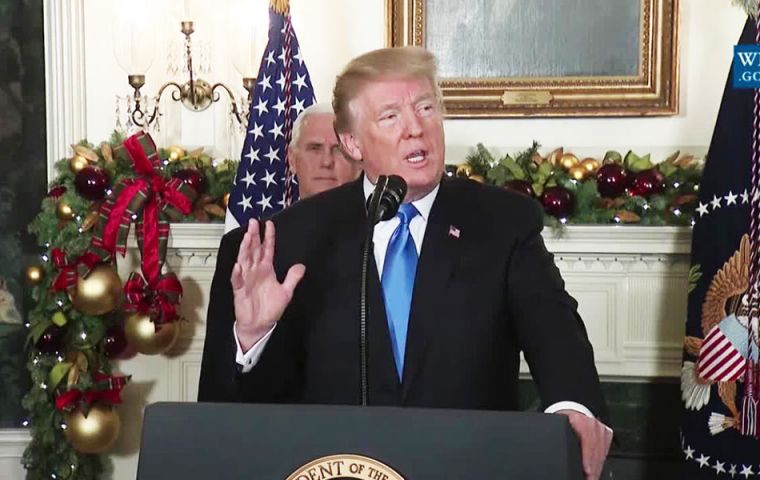MercoPress. South Atlantic News Agency
Trump recognizes Jerusalem as Israel's capital, and calls it a new approach to the Palestinian conflict
 “My announcement today marks the beginning of a new approach to conflict between Israel and the Palestinians,” Trump said from the White House
“My announcement today marks the beginning of a new approach to conflict between Israel and the Palestinians,” Trump said from the White House In a momentous shift of United States foreign policy in the Middle East, President Donald Trump officially recognized Jerusalem as the capital of Israel on Wednesday and initiated the process of relocating the U.S. embassy to the city from Tel Aviv.
“My announcement today marks the beginning of a new approach to conflict between Israel and the Palestinians,” Trump said from the White House, where he was joined by Vice President Mike Pence. He described it as a “long overdue step to advance the peace process.”
“While previous presidents have made this a major campaign promise, they failed to deliver,” he added. “Today, I am delivering.”
Trump's remarks were broad in nature, an intentional choice by the president, according to a source close to the White House. Trump said Wednesday that “the U.S. would support a two-state solution if agreed to by both sides.”
“Jerusalem is not just the heart of three great religions, but it is now also the heart of one of the most successful democracies in the world,” the president said. “Over the past seven decades, the Israeli people have built a country where Jews, Muslims, Christians, and people of all faiths are free to live and worship according to their conscience and beliefs.”
Until the new embassy in Jerusalem opens, current law requires the president to sign a waiver that keeps the embassy in Tel Aviv operable. The process of relocating the embassy is expected to take years.
Trump said the process of hiring “architects, engineers and planners” will begin “immediately.” The new embassy “will be a magnificent tribute to peace,” he added.
Secretary of State Rex Tillerson said in a statement following the president's speech that “the State Department will immediately begin the process to implement” the decision to move the embassy. He added that “the safety of Americans is the State Department's highest priority” and that the department has “implemented robust security plans.”
The approach described by the officials appears aimed at allowing the president to fulfill a key campaign promise while also attempting to soften fallout of his decision to move the embassy by delaying it for an undefined period of time.
A senior official downplayed concerns about threats of violence to U.S. citizens overseas as a result of the announcement, saying that the proper precautions have been taken.
“We’re obviously concerned about the protection of U.S. citizens, U.S. officials anywhere in the world,” an official said, adding that U.S. security agencies have been involved in the decision and are prepared to provide extra security that may be necessary.
Trump addressed the possibility of unrest from the White House, calling for “calm” and “moderation” and “for the voices of tolerance to prevail over the purveyors of hate.”
“Let us rededicate ourselves to a path of mutual understanding and respect,” he said.
A number of world leaders, including Pope Francis, spoke out against the decision on Wednesday. The pope's comments came during a previously scheduled meeting with a Palestinian delegation of religious and intellectual leaders prior to Trump's address.
“My thoughts now go to Jerusalem,” the pope said. “In this regard, I cannot keep silent about my deep concern over the situation that has arisen in recent days and, at the same time, a heartfelt appeal so that everyone would be committed to respecting the status quo of the city, in accordance with the relevant resolutions of the United Nations.”
French President Emmanuel Macron called the action an “unfortunate decision” and said “France does not approve it.”
“It goes against international law and the resolutions of the UN Security Council,” Macron said. “The status of Jerusalem is a security issue for the entire international community. The status of Jerusalem must be determined by Israelis and Palestinians in the framework of negotiations under the auspices of the United Nations.”
“He’s encouraged by the progress his peace team has made so far, I know a lot of that progress isn’t visible, I think that’s one of the things — I know he believes and I know the peace team believes — it’s partly because that progress is not visible that they’ve been able to make so much progress,” the official said.




Top Comments
Disclaimer & comment rules-

-

Read all commentsThe following article explains the Trump problem:
Dec 08th, 2017 - 01:00 pm +1https://www.rawstory.com/2016/01/a-neuroscientist-explains-trump-has-a-mental-disorder-that-makes-him-a-dangerous-world-leader/
https://www.congress.gov/104/plaws/publ45/PLAW-104publ45.pdf
Dec 07th, 2017 - 11:27 pm -1Perhaps the can kicking is coming to an end.
Commenting for this story is now closed.
If you have a Facebook account, become a fan and comment on our Facebook Page!